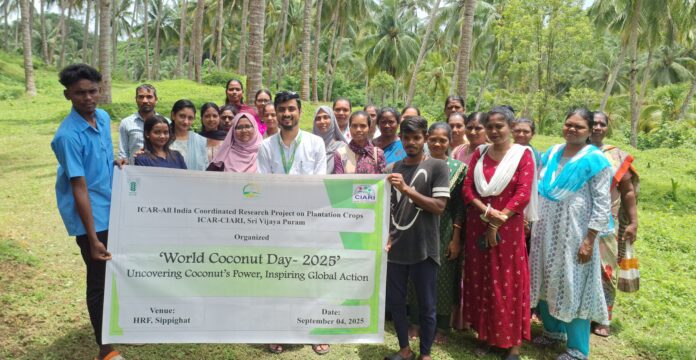World Coconut Day was observed at the Horticulture Research Farm in Sippighat under the ICAR-Central Island Agricultural Research Institute (CIARI) on September 4, 2025, highlighting the potential of coconut in shaping livelihoods and boosting farm-based income in the islands. The event, organized under the All India Coordinated Research Project (AICRP) on Plantation Crops, focused on the theme ‘Uncovering Coconut’s Power, Inspiring Global Action’, with researchers, women self-help groups, students, and farming enthusiasts participating in a day-long programme.
The global observance, which is held every year on September 2, seeks to underline the significance of coconut in sustaining communities. At the Sippighat centre, the institute adapted the spirit of the occasion to local conditions, with a blend of research demonstrations, field visits, and practical awareness activities. Participants were introduced to the multiple avenues through which coconut and its allied resources can serve as a foundation for sustainable livelihoods in island ecosystems.
The programme began with an orientation by researchers who explained how coconut cultivation has evolved to support income diversification. As part of the exposure, attendees visited the Dweep Agro Eco Walk, where the prospects of integrating coconut into agro-ecotourism were showcased. Such approaches, researchers explained, could create new opportunities in areas with fragile ecologies, blending conservation and livelihood prospects.
Field demonstrations provided participants with first-hand experience of coconut-based cropping systems. Models combining coconut with intercrops such as cinnamon, clove, nutmeg, black pepper, elephant foot yam, banana, pineapple, rhizomatous spices, and ornamental plants were presented. These integrated systems are aimed at increasing overall farm productivity, resilience, and income security. Attendees were also shown the diversity of coconut varieties conserved at the institute’s World Coconut Germplasm Centre, reflecting the genetic richness that sustains both research and cultivation prospects.
Practical solutions for challenges faced by coconut farmers were a key part of the programme. Demonstrations included the use of pheromone traps for monitoring and managing rhinoceros beetles, one of the most damaging pests of coconut. Methods of conserving water through specially designed structures, soil protection using geo-textiles in erosion-prone areas, and innovative harvesting techniques using tools like DweepCinnRub were also shared with participants. Such approaches, researchers emphasized, are critical for adapting cultivation practices to island-specific constraints.
The event was attended by 23 women, including members of 10 self-help groups, students, and young enthusiasts. Organizers noted the importance of empowering women farmers and local communities with practical knowledge, linking traditional cultivation to modern innovations. The session concluded with the distribution of planting material of DweepHaritha, an improved variety developed by ICAR-CIARI, known for its resilience and productivity.
The celebration was organized with institutional support and collaborative participation. The guidance of the institute’s leadership and coordination by associated partners ensured that the programme integrated scientific perspectives with practical demonstrations. For many participants, the exposure to farm-based innovations and the emphasis on coconut’s role in both agriculture and eco-tourism offered a glimpse into potential pathways for rural development.
By linking coconut research with livelihood security and innovation, the event reinforced the crop’s relevance beyond its traditional uses. For an island region like Andaman and Nicobar, where ecological sensitivity and livelihood concerns often intersect, such programmes highlight how crops like coconut can be repositioned as engines of sustainability and economic resilience. The event also drew attention to the global push to harness the crop’s potential, underscoring how local initiatives connect to broader agricultural priorities worldwide.





